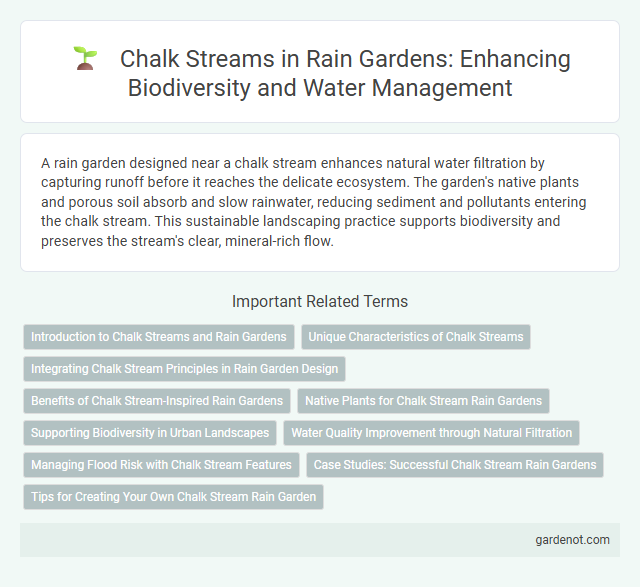A rain garden designed near a chalk stream enhances natural water filtration by capturing runoff before it reaches the delicate ecosystem. The garden's native plants and porous soil absorb and slow rainwater, reducing sediment and pollutants entering the chalk stream. This sustainable landscaping practice supports biodiversity and preserves the stream's clear, mineral-rich flow.
Introduction to Chalk Streams and Rain Gardens
Chalk streams are clear, alkaline waterways that support diverse ecosystems, making them ideal for environmental conservation efforts. Rain gardens, designed with native plants and permeable soils, mimic natural filtration processes to reduce runoff and protect chalk stream water quality. Integrating rain gardens within chalk stream catchments enhances biodiversity and mitigates pollution from urban and agricultural sources.
Unique Characteristics of Chalk Streams
Chalk streams are rare freshwater ecosystems primarily found in southern England, characterized by their clear, alkaline, and mineral-rich water that supports diverse flora and fauna. Their steady flow, fed by groundwater from chalk aquifers, creates a stable environment ideal for species such as brown trout, water crowfoot, and native crayfish. These streams' unique hydrological and ecological traits make them vital for biodiversity and natural water filtration.
Integrating Chalk Stream Principles in Rain Garden Design
Integrating chalk stream principles in rain garden design enhances natural filtration by mimicking the unique hydrology and ecology of chalk streams, characterized by stable flow and high water quality. Incorporating native chalk stream vegetation such as watercress and brooklime supports biodiversity and sustains aquatic life adapted to alkaline, calcium-rich conditions. Designing rain gardens with permeable substrates and gentle flow gradients replicates chalk stream habitats, promoting groundwater recharge and reducing urban runoff impacts.
Benefits of Chalk Stream-Inspired Rain Gardens
Chalk stream-inspired rain gardens enhance groundwater recharge and improve water quality by filtering pollutants naturally through porous chalk substrates. These gardens support biodiversity by creating habitats similar to chalk stream ecosystems, attracting native plants, invertebrates, and amphibians. Their design mimics the clear, oxygen-rich waters of chalk streams, promoting healthier urban water cycles and reducing flood risks.
Native Plants for Chalk Stream Rain Gardens
Native plants such as water avens (Geum rivale), brooklime (Veronica beccabunga), and marsh marigold (Caltha palustris) thrive in chalk stream rain gardens, providing essential erosion control and water filtration. These species are well-adapted to the alkaline, nutrient-rich waters of chalk streams, supporting local biodiversity and improving habitat quality for aquatic life. Integrating native vegetation enhances the rain garden's ability to manage stormwater runoff while preserving the delicate ecological balance unique to chalk stream environments.
Supporting Biodiversity in Urban Landscapes
Chalk streams, renowned for their clear water and stable flow, create unique habitats that support diverse aquatic life and plants. Incorporating rain gardens in urban landscapes along these streams enhances native biodiversity by filtering pollutants and providing refuge for pollinators, amphibians, and bird species. This integration promotes ecological resilience and helps maintain the natural balance of chalk stream ecosystems amid urban development.
Water Quality Improvement through Natural Filtration
Chalk streams support rain gardens by providing natural filtration that enhances water quality through gravel and sediment layers. These rain gardens filter pollutants like nitrates, phosphates, and heavy metals, reducing runoff contamination in chalk stream ecosystems. The improved water clarity and oxygen levels promote healthier aquatic habitats and biodiversity.
Managing Flood Risk with Chalk Stream Features
Chalk stream features play a critical role in managing flood risk by enhancing groundwater recharge and slowing surface water flow, which reduces peak runoff volumes. Integrating rain gardens in chalk stream catchments improves filtration and vegetation uptake, helping to control sediment and nutrient loads. These natural filtration systems mimic the chalk stream's porous substrate, stabilizing streambanks and mitigating downstream flooding impacts.
Case Studies: Successful Chalk Stream Rain Gardens
Case studies of successful chalk stream rain gardens demonstrate significant improvements in water quality and biodiversity by effectively managing stormwater runoff and reducing pollutants entering the waterway. In regions like the River Itchen in Hampshire, strategically designed rain gardens have enhanced habitat connectivity and supported native aquatic species, including brown trout and white-clawed crayfish. These projects highlight the role of rain gardens in restoring chalk stream ecosystems by promoting natural filtration and stabilizing hydrological cycles.
Tips for Creating Your Own Chalk Stream Rain Garden
Creating a chalk stream rain garden requires selecting native chalk stream plants like water crowfoot and starwort to enhance biodiversity and water filtration. Position the garden in a natural depression to capture and slow runoff, mimicking the chalk stream's clear, cool flow characteristics. Incorporate gravel and sandy soil layers to improve drainage and replicate the chalk aquifer's porous substrate, promoting healthy groundwater recharge.
Chalk stream Infographic

 gardenot.com
gardenot.com